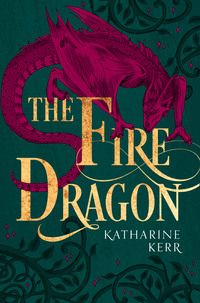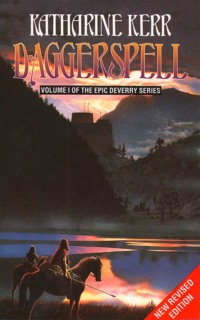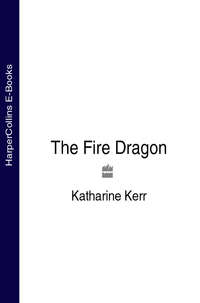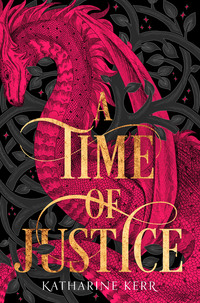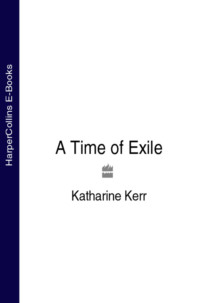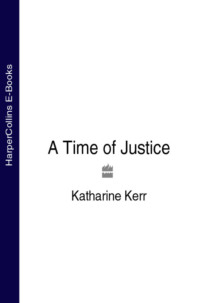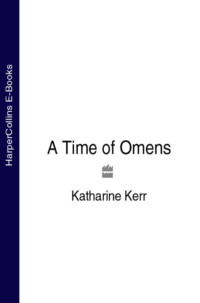
Полная версия
The Gold Falcon
‘So am I. I truly am.’ Branna crossed to the window and looked out. She could see past the ward and over the dun wall to the green fields and the stream beyond. ‘It’s even a lovely view. At home I could look out over the cook house, and the smoke really was awful.’
‘That woman!’ Galla rolled her eyes heavenward.
Branna sat down on the broad stone windowsill and leaned out, just slightly, to look up at the sky. A solitary raven was hovering over the dun on outstretched wings. As she watched, she realized that while it looked the size of an ordinary bird, it had to be flying extremely high, because she couldn’t see its eyes or the fine points of its wings. The only explanation could be that it was abnormally large. It flapped and circled, then hovered again, as if it were studying the dun below. She waited and watched, as it repeated the manoeuvre, but no other ravens flew up to join it, and it never made a sound. Finally, with one last flurry of black wings, it flew away, heading north.
‘What is it, dear?’ Galla said.
Branna drew her head back inside. ‘Probably naught. A solitary raven, and I thought it was watching us.’
‘It was probably just eyeing the stables in the hopes of stall sweepings. They eat the most disgusting things, ravens.’
‘True spoken, but this one – I don’t know why, but it chilled my heart. It seemed so large, for one thing.’
‘Perhaps it was a rook, not a raven at all.’
‘Well, that could be it. Silly of me, I know.’ Branna arranged a bright smile. In her chilled heart she doubted very much indeed that the bird she’d seen was a rook or any other natural animal. Yet what else would it be? she asked herself.
‘I think we’ve finished here,’ Galla said. ‘Shall we go down to the great hall?’
As they were walking over to the table of honour, Branna noticed Neb, sitting on the servants’ side of the room near a window. In the patch of sunlight that fell onto his table lay sheets of parchment, upon which he was scoring lines with the back of his little penknife against a strip of wood. A fat yellow gnome crouched on the table beside the parchments. It turned its head, leapt to its clawed feet, and began dancing on the parchments. Neb laid down his penknife and swatted at the gnome, who turned and pointed at Branna. Neb raised his head and looked her way. He certainly does see the Folk! she thought. Young, skinny, so completely different from the old man she’d often dreamt about – and yet his ice-blue eyes seemed so familiar that she nearly ran to him, nearly called him by the name she’d given him for her tales: Nevyn.
Neb raised his hand in greeting and smiled at her, as if he were hoping she’d join him, but Aunt Galla beckoned to her, and her cousin Mirryn was already sitting at the honour table. Branna risked a smile Neb’s way, then hurried after her aunt.
Branna passed the afternoon pleasantly, playing carnoic with Mirryn, chatting with Galla. Lord Veddyn joined Neb at his table and began reciting the list of taxes owed, stumbling every now and then over his faulty memory, so that the scribe could write them down. At each lapse, Galla would stand up and shout corrections Veddyn’s way. Once in a while, as casually as she could manage, Branna would steal a look at Neb. Often enough she found him looking back. They would both blush and look away again.
Since she was tired from her journey, Branna went to bed early. Unlike her old bed in her father’s dun, her new mattress was soft and comfortable, and the down pillows smelled fresh, not sour. She lay down, then turned on her side to look at the sliver of starry sky visible through her window. Earlier she’d resolved to give up her strange dreams of dweomer, but as soon as she fell asleep, a dream took her over.
She was standing at another window, looking at the sky. A full moon drifted in the field of stars. As she watched, the moon began to shrink until it turned into a gem, an opal, she thought, but it gleamed just as brightly as before. Suddenly she stood inside a chamber, and an old man, dressed in the brown tattered clothes of a poor farmer, was holding the opal out to her.
Branna woke and sat up. Judging from the wheel of stars outside her window, dawn lay a long way off. Her gnome appeared and flopped down on the bed beside her.
‘Another odd dream,’ she told it. ‘Twice odd, really, because it wasn’t the sort of dream I used to weave into a story, but it truly did seem more important than the usual sort of dream.’
The gnome yawned, then left its mouth half-open and began to pick its teeth with one skinny fingernail.
‘And of no interest to you, obviously. Humph!’
Branna lay back down again, and fell back asleep almost immediately. She had no more dreams that night, or at least, none that she remembered when she woke with the dawn.
On the day after Branna’s arrival, the tieryn and his warband rode back to the dun. From the window of his tower room Neb watched them file through the gates – the horses weary, the men covered with dust from the roads. A provision cart and a couple of mules with empty packsaddles followed them, but no villagers walked behind, not a single man, woman, or child. Neb’s eyes filled with tears as his last shred of hope blew away like the dust in the wind. He and Clae alone had escaped the Horsekin.
In his grief Neb decided against going down to the bustle and confusion of the great hall. He could wait to hear the grim report of what the warbands had found. When the sun had sunk low in the sky, however, Salamander came to his chamber. The gerthddyn had bathed and put on fresh clothes, including a shirt so heavily embroidered that it draped as stiffly as leather.
‘I’ll wager you can guess my news,’ Salamander said. ‘No one was left alive. We buried your uncle. I fear me your aunt’s been taken by the Horsekin.’
‘And the other women, too?’
‘Just that. I’m sorry.’
Neb stared into empty air and fought the memories down.
‘We’d best get ourselves to the great hall,’ Salamander went on. ‘They’re serving the evening meal, and the tieryn wants you to write an important letter.’
A spiral staircase wound down to the great hall, dim with the shadows of twilight. Near the door the men of the warband were drinking at their tables while they waited for their dinner. Across from them, near the nobles’ hearth, Tieryn Cadryc sat at the head of the table of honour with his wife at his right hand. Branna was sitting next to Lady Galla. She wore a pair of clean dresses, the outer a pale blue, cut short in front and slashed at the sleeves to reveal a grey underdress. An embroidered band of interlace ran around the neck, and like a pendant hanging from a chain an embroidered dragon lay just over her collarbone. Neb felt himself blush for no particular reason, then noticed the gerthddyn staring at her, his lips half-parted as if in surprise. Or was it sexual interest? Neb wanted to slap him across the face, but the emotion shocked him so much that he managed to suppress it.
‘Have you met Lady Branna before?’ Neb said.
‘The ice in your voice, lad, would freeze most men’s blood.’
Neb raised one eyebrow and considered him.
‘Ye gods,’ Salamander said, ‘the look in your eyes just might do the same.’
‘Have you met her before?’
‘I’ve not.’
‘Then you’d best mind your manners around her.’
Salamander opened his mouth, then shut it again. Neb turned on his heel and strode off to the honour table, where Tieryn Cadryc waited for him.
After the meal, Salamander went up to the little room in the broch that Lady Galla had given him, a wedge of the circular floor plan defined by woven wicker partitions, but private nonetheless, because the compartments to either side held stacks of curing firewood. He spread his blankets out on the mattress on the floor, then strolled over to the unshuttered window. He could see over the dun walls to the meadows off to the east, where a quarter moon was just rising out of mist. When he boosted himself up to sit on the wide stone windowsill, the Wildfolk came to join him, a flock of sprites in the air, a gaggle of gnomes on the floor and the sill.
‘Well, this is a pretty predicament, isn’t it?’ Salamander said to them. ‘I’ve seen my brother now, and I can’t say I cared for the sight.’
The Wildfolk all nodded in sad sympathy. Beyond the window the mist in front of the rising moon glowed and seemed to swirl in the distant light. Salamander focused upon it and let his mind fill with the memory of the silver wyrm, flying overhead on huge wings. In but an instant the memory turned into a vision. The silver dragon lay curled on a flat outcrop of rock among high mountains, his scales gleaming in the moonlight. He was perhaps eating something he held nestled against his side; Salamander could see the enormous head moving in a regular rhythm, licking something – licking a wound. The dragon moved restlessly, tossing his head, and Salamander could finally distinguish a dark streak on his side, oozing what appeared to be blood. In a moment the dragon went back to cleaning the wound with the only tool he had, his own tongue, a gesture so like that of a dog that Salamander felt profoundly nauseated.
His brother was living like an animal. No, his brother was an animal now, albeit a sapient creature who could speak, and in several languages at that. But he had no hands, no tools to ease his life, nothing but what his dragon form gave him. Salamander broke the vision. As if they felt his distress, the Wildfolk crowded closer.
‘Ye gods, I feel sick and twice so,’ Salamander said. ‘I think me I’d best talk to my master in the dweomer.’
This time, when he gazed into the moon-mist he thought of Dallandra, his teacher and saviour. At first he remembered her face; then he thought he might be seeing her face; all of a sudden he did see it. Her steel-grey eyes were narrow with concentration, and wisps of her ash-blonde hair hung untidily across her forehead and stuck to her cheeks. Yet, although the vision enlarged, the mist only thickened, swirling around her and threatening to hide her entirely.
‘Dalla,’ he thought-spoke to her in Elvish. ‘Dalla, it’s Ebañy. Is something wrong?’
He saw her flinch in surprise, then smile. She sat back on her heels and appeared to be looking straight at him. Through the mist he could see flickering light. Smoke and a fire?
‘What do you mean, is something wrong?’ she thought her answer back to him.
‘I can barely see you for the smoke.’
‘It’s not smoke. We’re still on the coast. It’s high tide, and the ocean’s etheric veil is running high with it. Let me sharpen the image.’
With that he could see her clearly. She was kneeling in front of the flickering light, which proved to be a small campfire.
‘That’s much better,’ he said. ‘You haven’t left? I thought you’d have all started north by now.’
‘We had to wait for Carra to get back from Wmmglaedd. She and Meranaldar went there to talk history with the priests. We’ll ride out on the morrow, most likely. Where are you?’
‘In Tieryn Cadryc’s dun once more. I’ve got strange news. I’ve seen our Rhodry, but I don’t think he recognized me. It was down in the Melyn river valley.’
‘Does he look well?’
‘No. I mean, by the Dark Sun herself! How could he look well in that body? He’s a dragon, all scaly.’
‘Calmly now! Your thoughts are beginning to dance around.’
‘Sorry.’ Salamander took a deep breath. ‘But he seems to have hurt himself somehow. There’s something that looks like a dagger’s cut over one rib.’
‘How very odd! It couldn’t still be the old wound, the one I couldn’t get to staunch. On a creature the size of a dragon, it should have healed right up.’
‘Why would it? If it was a magical curse or suchlike –’
‘But it wasn’t any such thing. When it happened, I wasn’t thinking clearly, so I didn’t see the obvious. About a month later, when I was watching the men in my alar butcher a sheep, I realized the dagger had punctured a lung. There’s a tremendous lot of blood vessels there, and most of the blood was draining into his chest cavity. He was drowning, actually, in his own blood.’
For a moment Salamander nearly lost the vision in a wave of compassionate disgust. He steadied his mind and went on. ‘Then if it wasn’t a dweomer wound, what I saw must be a fresh injury. Perhaps something he was trying to eat fought back.’
‘Very likely, yes. Well, there’s naught I can do about it, unfortunately, unless he seeks me out, and so far, he hasn’t. Do you have any other news?’
‘Oh, a few small titbits.’ Salamander paused for drama’s sake. ‘I also ran across Nevyn, Jill, and Cullyn as well – or at least, I think it’s Cullyn. I only saw him once or twice, and that was years ago.’
‘You what? Ye gods! They’ve all been reborn?’
‘Yes, all reborn and here together, and Neb’s growling like a dog with a stolen joint of mutton at anyone who casts an unseemly glance at little Branna. I wonder if Gerran’s noticed the lass yet? Things could turn most unpleasant, you know, should he take a fancy to her. They’re all still quite young. I’d say that Gerran’s the oldest of the lot, and he seems to be about twenty. I really wish that Deverry men kept better track of things like someone’s age.’
‘They don’t have much reason to, I suppose. So Gerran is the man you think is Cullyn reborn?’
‘Yes. Sorry, I wasn’t being clear. The other names –’
‘I could guess them, yes. Tell me about them. How did you find them?’
‘It was more like they found me.’
Dallandra listened intently to his tale, breaking her concentration only to feed a few sticks of wood into her little fire.
‘Do Neb and Branna remember who they are?’ Dalla said when he’d finished. ‘Or were, I should say.’
‘No. They do both see the Wildfolk.’
‘Odd. I would have thought that Neb at least would have memories of working dweomer.’
‘So would I. Of course, he may have them but be keeping them to himself.’
‘That’s quite true.’ Dallandra paused briefly. ‘What about Neb’s little brother?’
‘I don’t recognize him at all.’
‘That’s interesting in itself. If you need me, I can gather an escort and ride your way.’
‘My thanks. I just might take you up on that. There’s another thing, oh mighty mistress of magicks. The Horsekin. They’ve been raiding in the Melyn river valley.’
‘Again?’
‘Again. It’s most peculiar, too. They sent a sizeable warband of heavy cavalry to burn two villages. For their trouble they got maybe thirty slave women and girls and two small boys. They didn’t even bother harvesting the wheat in the fields. Does that make sense to you?’
‘No, it certainly doesn’t.’
‘I’ve been talking with the tieryn and his captain – Gerran, that is – about the raids. Their history is peculiar as well. Imagine in your mind the western flank of Deverry. Now imagine a line running from Cengarn down straight south to the sea. The Horsekin only attack settlements to the west of that line.’
‘I suppose the settlements farther east are too well guarded.’
‘Not on your life, oh princess of powers perilous. I suspect – and as of now it’s a mere suspicion only – that the Horsekin are trying to stop human settlement from spreading.’
‘To protect their borders?’
‘Their borders are too far north for that. No, I wonder if there’s something they want to hide out to the west of here.’
‘Hide? Such as what?’
‘Such as a permanent camp set up to outflank the men of the Rhiddaer. It’s the only thing I can think of, anyway.’
Salamander could feel her shock as if it rode on a wave of mist, breaking over him. When her thoughts reached him, he could feel their venom as well.
‘That would be just like them, wouldn’t it?’ Dallandra thought-spoke. ‘They’ve had forty years to lick their wounds from the last war, and now they’re ready for more trouble.’ She paused, and her image flickered and grew thin as she withdrew her attention from scrying. In a few moments it clarified and grew bright again. ‘They can’t attack the Rhiddaer directly – yet. I’d guess they’re trying to cut it off from any possible help from Deverry.’
‘Perhaps that. Perhaps to cut it off from our folk, as well, or to cut us off from Deverry, or Deverry off from us. I know not, but I surmise much, none of it pleasant. I was wondering if any of our people have stumbled across this whatever it is, if indeed it exists, or if they’ve heard rumours, hints, clues, or even suspicions.’
‘I’ll find out. We’re on our way to the alardan for the summer festival. I’m riding with the prince’s alar, and of course Calonderiel and his archers are, too.’
‘Excellent! Cal’s just the man we need. I’d hoped to come west for the festival, but I think I’d better keep an eye on things here.’
‘Yes, do. How have you been faring? Your mind feels steady to me, but after what you’ve been through –’
‘No sign of a recurrence, I assure you, oh princess of powers perilous.’
‘Good. Let me know at the first sign of any trouble.’ With a smile for a farewell, Dallandra broke the link between them.
Salamander stayed in the window and considered the view without truly registering it. I used to call Jill the princess of powers perilous, he thought. Back before I went mad, back before I lost everything I loved, there in Bardek.
No matter how carefully he thought about his return to Deverry from the southern islands, some forty years ago, he could never remember it. There had been a ship, of course – how else could he have crossed the ocean between Bardek and Deverry? How he had boarded that ship, and why he’d left his wife and children behind, had fallen out of his memory like apples falling through a rotted sack. The madness, he thought. With my mind all to pieces like that, it’s a wonder I can remember anything. He could bring up a few memory-images of landing in Eldidd, where Dallandra had been waiting to take him into her care.
Curing his madness had given Dallandra a hard ten years’ work. Once his mind began healing, Salamander had devoted several years to his youngest son, who suffered from mysterious troubles, before he’d returned to Bardek. Once there, he had searched all over the islands for a good long while before he finally found the troupe of travelling acrobats led by his eldest son, a grown man by then with children of his own. Kwinto had given his truant father a cold enough welcome, too.
‘Too late,’ Salamander said aloud. ‘Too late to see Marka again, too late to prove to her that I kept my promise. I did come back, my love, truly I did.’
He could see her in his mind so clearly, and as always, he remembered her as a slender young woman, laughing, smiling, tossing her head of curls as she ran to greet him – so clearly that it seemed he could reach out and take her hand, but only empty air returned his grasp. She’s dead, he reminded himself. She died before you found them. He leaned his head back against the cold stone and wept.
Dallandra smothered her little fire, then left her tent, which stood on the edge of the encampment. When she turned towards the sea, she could see the tidy whitewashed buildings of the new town, Linalavenmandra, a name that meant ‘sorrow but new hope’, though most often its inhabitants merely called it Mandra, ‘hope’. From her vantage point, its whitewashed square buildings seemed as pale as ghosts against the night-time sea. Even though returning refugees from the Southern Isles had built the town over twenty years ago, it still amazed her every time she saw it: a proper town, sheltering not Deverry men but her own folk, with a town square and straight streets, trees and gardens, a town fountain and a holy spring. Beyond it, out of her immediate sight, lay farms. All her long life she’d known only wild sea grass in this spot, sea grass and rock and the winter waves that crashed and boomed on the long pale beach. The waves still crashed, but onto a rocky sea wall now, jutting out into a new harbour, where a wooden pier offered docking for elven longships.
With a shake of her head, Dalla turned away and strode through the camp. Despite the new town, most of the People, as the elven folk called themselves, still spent every spring and summer travelling in small groups, or alarli, following their herds of horses and flocks of sheep. In this alar two dozen round tents sprawled across a meadow near a stream. Out in the grasslands behind them, a herd of over four hundred horses, guarded by armed riders, grazed at tether.
In among the tents, the adults stood talking together in twos and threes or sat around small fires, finishing the evening meal. Children ran around, playing with leather balls, chasing each other or their dogs. Occasionally Wildfolk materialized to join the games. Warty little gnomes wandered between the tents; translucent sylphs and pale sprites flitted after the children or teased the dogs, who couldn’t see them but who could feel their pinching fingers. The dogs would bark and snap, and the Wildfolk would disappear, only to pop up smirking somewhere nearby.
On the surface the camp seemed no different from the elven camps Dallandra had always known. The tents were just as brightly painted, the fires just as warm. The People lived their lives as noisily as ever, in a society of ever-shifting relationships that made Deverry folk shake their heads in bewilderment. But here and there Dalla saw the signs that everything had changed.
In front of every tent, like guests at the meal, stood longbows and quivers. Mail shirts and other pieces of armour lay close at hand as well. Most of the men and some of the women wore swords, even when they were merely chatting with old friends. At the cry of birds passing overhead the camp would fall silent; hands on sword hilts, a few men would look up, judging whether or not the birds were ordinary creatures or magical spies, mazrakir, as the Horsekin called shape-changers. Sooner or later, everyone knew, the same raids that were bleeding the human farmlands were bound to ride their way.
In the middle of the camp Dallandra finally spotted the Banadar, or warleader, of the Eastern Border, to give Calonderiel his official title. He was sitting by himself on a dead log in front of his tent, the second largest in camp. In the flickering firelight the deer painted upon the tent walls seemed at moments to fling up their heads, ready to run. Calonderiel’s hair gleamed, so pale it was almost white, but shadows hid his violet eyes.
‘I’ve spoken to Ebañy,’ Dallandra said. ‘And I see trouble coming.’
Calonderiel looked up, startled. ‘What’s he done now?’
‘It’s not what he’s done, it’s what he’s found.’
Calonderiel moved over to give her room to sit beside him on the log, but after a moment’s hesitation, she knelt on the ground nearby. At the gesture he winced; he’d fallen in love with her all over again, and as it had before, his devotion annoyed her. Before he could speak of his feelings, she brandished Salamander’s news like a shield.
‘The Horsekin are raiding in Arcodd again.’
‘Bastards!’ Calonderiel paused to spit into the fire. ‘I wonder if Cengarn’s going to call in our alliance?’
‘I don’t know, but maybe Ebañy can find out. He thinks the Horsekin might be trying to hide something, a fort or armed camp, he said, near the border.’
‘And they’re using the raids as a distraction?’
‘Well, that’s what he suspects. He doesn’t know. I take it that seems logical to you.’
‘It’s the first thing I thought of. If his suspicions are right, we’ll have to mount some kind of attack. A Horsekin fort nearby? Ye gods, it’s like a dagger at our throats!’
‘That’s rather what I thought, too.’
‘We might be the ones to call in our alliance with Cengarn, not the other way round. At least we have Mandra now. If things get desperate, we can get the prince and his family to safety there and fortify the place. If it looks like the town’s going to fall, well, they have boats.’
‘Do you think things will get that desperate?’


